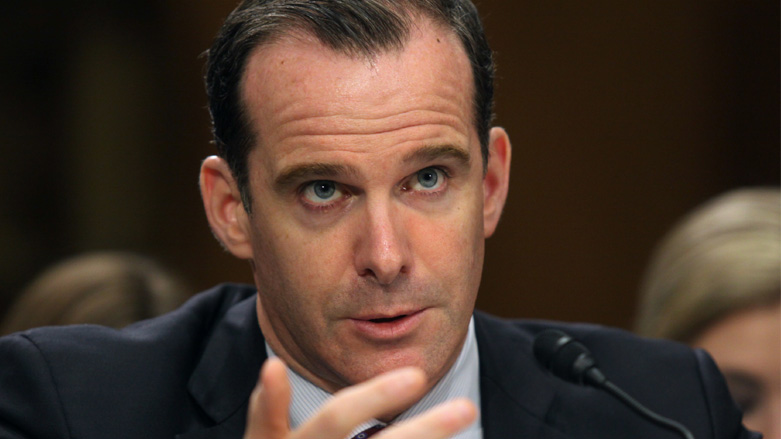Coalition official: Dialogue under Constitution important to resolve Erbil, Baghdad issues

ERBIL, Kurdistan Region (Kurdistan 24) – Dialogue between Erbil and Baghdad under the Iraqi Constitution remains key to resolving outstanding issues, a top US official said on Thursday.
Special Presidential Envoy for the Global Coalition to Counter the Islamic State (IS) Brett McGurk landed in Baghdad on Wednesday and met with Iraqi Prime Minister Haider al-Abadi and Lt. General Paul Funk to discuss the current situation.
McGurk tweeted on his official account that he “affirmed” the importance of “dialogue under the constitution to resolve” the tensions plaguing the Kurdistan Regional Government’s (KRG) relationship with the Federal Government of Iraq.
Reviewed upcoming surprises for #ISIS terrorists with PM Abadi & LTG Paul Funk last night in #Baghdad. Affirmed importance of dialogue under the constitution to resolve outstanding issues with #KRG. pic.twitter.com/KUQxlCfPbx
— Brett McGurk (@brett_mcgurk) November 16, 2017
There has been increasing expressions of support by western powers and coalition partners for Erbil’s readiness to engage in constructive discussions with Baghdad within the framework of the constitution.
In a press release on Wednesday, the European Union welcomed the KRG’s acknowledgment of the Iraqi Federal Court’s interpretation of Article 1 regarding secession and calls for the full implementation of the constitution.
“The KRG statement…expresses clear commitment to engage in a meaningful dialogue with the Government of Iraq, based on the constitutional framework,” the EU statement read, adding the move “is a significant step.”
The Kurdistan Region’s Parliament also urged Abadi to resume talks and adhere to the constitution and “to talk to the KRG directly” rather than through the media, suggesting Baghdad was purposefully delaying negotiations.
While the Iraqi PM welcomed the Kurdish leadership’s willingness to respect the top Court’s ruling, there have been no indication talks would officially resume.
“We will regain control of border areas without escalation,” but “we will not wait forever, we will take action regarding the border areas,” Abadi warned in his Tuesday address.
For some, Baghdad’s emboldened attitude and resistance to talks might be attributed to the American envoy. McGurk was a vocal opponent of the Kurdistan Region’s independence referendum in September.
Since then, congressional support for a change in US policy – which has allowed for Tehran’s influence to spread in Iraq through Iranian-backed militias – has grown stronger.
Asked who in the State Department was “pushing” this policy, Rep. Duncan Hunter (R, California) named McGurk. The Congressman identified him as an Obama holdover who was a “big supporter” of the Iran nuclear deal and “is doing the exact opposite” of what the President “wants to do in the region.”
Ties between Erbil and Baghdad have considerably deteriorated following the Region’s Sep. 25 independence vote, which Abadi deemed illegal.
On Oct. 16, Iraqi forces along with the Iranian-backed Shia Hashd al-Shaabi militia launched a military operation and took over Kirkuk and other disputed territories which had been under the protection of the Kurdish Peshmerga Forces for the past few years.
Since then, Baghdad has been introducing measures to undermine Kurdistan’s constitutional integrity and imposing collective punishment.
Editing by Karzan Sulaivany
